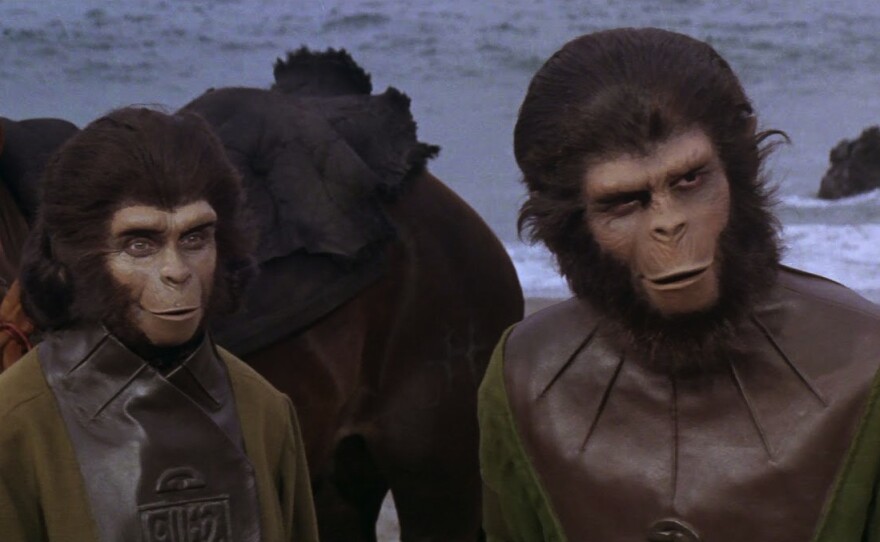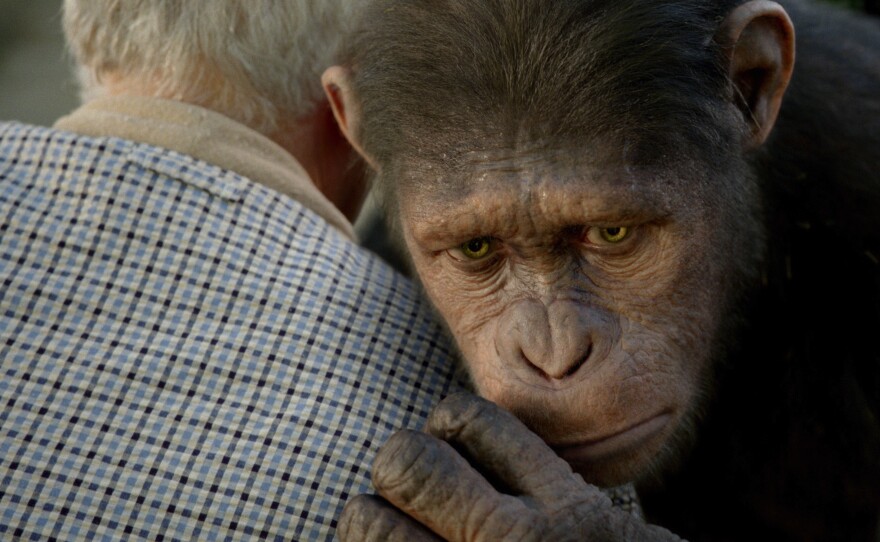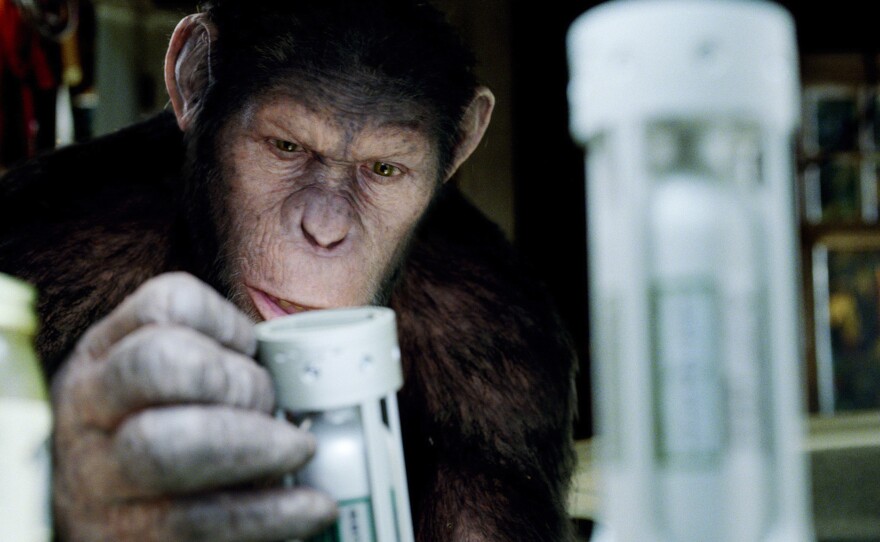I have to confess, I'm a sucker for ape movies from "King Kong" to "Planet of the Apes," I love those primates. And now there's a prequel to "Planet of the Apes" with the unwieldy title of "Rise of the Planet of the Apes" (opened August 5 throughout San Diego).

Pierre Boulle's 1963 French novel "La planète des singes" was adapted by Rod Serling and Michael Wilson for the 1968 American film "Planet of the Apes." The film, directed by Franklin J. Schnafner, became an instant sci-fi film hit. The story about a futuristic planet (that turned out to be earth) ruled by talking, intelligent apes was smartly written and had ideas that excited the imagination. The film also displayed some stellar make-up effects that allowed Kim Hunter and Roddy McDowell to give two magnificent ape performances. It was followed by a succession of mostly lame sequels ("Escape From the Planet of the Apes" being the exception), a dull TV series, and an atrociously misguided remake in 2001 by Tim Burton. A stunning 40th Anniversary box set collection of Blu-ray releases of the original 5 films recently hit stores and provides the perfect lead in to the latest "Apes" outing: "Rise of the Planet of the Apes," a prequel to the whole "Apes" franchise. (Although the film is also listed as a remake of "Conquest of the Planet of the Apes" because of the character of Caesar and his rebellion against humanity.)
"Rise of the Planet of the Apes" gives us the backstory to how apes eventually learned how to speak and dominate the planet, turning humankind into a slave race. It all starts in a lab but it's not rage-infected monkeys that set the plot in motion but rather a well-intentioned scientist looking for a cure to Alzheimer's. Will Rodman (James Franco) has been testing a drug on a chimpanzee he names Bright Eyes (the same name Dr. Zira uses for her test subject of Charleton Heston in the first film) with promising results. But things go awry, the ape dies, and Rodman ends up rearing the chimp's son at his home. Caesar (Andy Serkis with Weta-enhanced CGI), as the chimp is come to be known, grows up and grows smarter. He eventually rises up against humans, many of whom treat him horribly, and leads a rebellion against them... thus paving the way for what we find in "Planet of the Apes." And don't complain about spoilers, all that is pretty much laid out in the trailer.
When this project was first announced it sounded more like an opportunity for Peter Jackson's New Zealand-based Weta Digital to strut its stuff than an attempt to genuinely add a story to the cycle of films. Weta had already proven that it could create realistic ape effects with their work on Peter Jackson's remake of "King Kong." But that was essentially one giant ape and "Rise of the Planet of the Apes" would allow them to show more of what they were capable of now with multiple ape characters needing to be rendered. So while the early ape footage looked to have some convincing effects, I was worried there might not be a story to support the effects. I am happy to report that I was wrong.
Rick Jaffa and Peter Chernin [CORRECTION: co-writer is Amanda SIlver; Chernin is one of the producers] have crafted a satisfying script. It's not as smart as the one Serling and Wilson wrote for the first film but it gets the job done and is substantial enough to make the film about more than just the make up effects. The relationship between the humans and apes isn't as cleverly written as in the first film but Caesar develops as a solid and interesting character. In all honesty, though, it is the success of the effects that make the film so readily enjoyable. If you did not come to care for Caesar, the film would probably flop. But Serkis and the Weta effects team do a wonderful job of making Caesar real. Yes it is all a bit silly if you think about the story and the premise takes a suspension of disbelief but the dazzling effects make you willing to suspend your disbelief quite willingly.

Serkis I have discovered is much better when he is CGI-ed as in "Lord of the Rings" (as Gollum) or as King Kong or here as Caesar. When he's human he tends to overact and appears hammy, almost like some silent film star suddenly thrust into the more realistic world of today's filmmaking. But as an actor using motion capture to create a character that will eventually be completed through CGI, he's quite gifted. The exaggeration you sometimes find in his "human" performances seems to work well when the performance will be completed on a computer. We see Caesar's transformation and his emotions and are won over by his performance.

The humans pale in comparison. Franco and Frieda Pinto (as the love interest) make an attractive pair while Brian Cox, David Oyelowo, and Tom Felton are fittingly and one-dimensionally evil. Felton (Draco Malfoy in the "Harry Potter" films), though, does get to say the variation on Charleton Heston's classic line, " Take your stinking paws off me, you damned dirty ape!" In fact the film has a number of nice references to the original film. It foreshadows just enough of what is to come in "Planet of the Apes" to satisfy fans of the original film but not so much as to alienate a younger audience that might never have see the 1968 film.
Rupert Wyatt, of the indie film company Picture Farm, directs the film with craftsman-like efficiency. Not much artistry on display or inspired vision but he gets the job done and keeps us engaged. He seems more at home with the animals than the humans but that works to the benefit of the film. The interaction among the animals is well done and even chilling at times.
"Rise of the Planet of the Apes" (rated PG-13 for violence, terror, some sexuality and brief strong language) ranks as the third best in the "Apes" franchise, coming after "Planet of the Apes" and "Escape from Planet of the Apes." It's fun to see this on the big screen and then break out the Blu-ray of the original to see how the two flow together. But the bottom line is: the apes rule. Or as someone at work just said: "Two opposable thumbs up."
Companion viewing: "Planet of the Apes," "Escape from the Planet of the Apes," "Splice," "King Kong"






